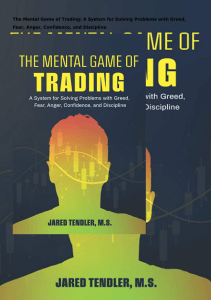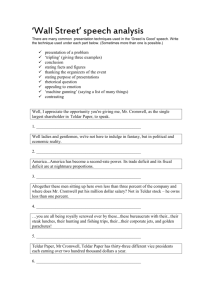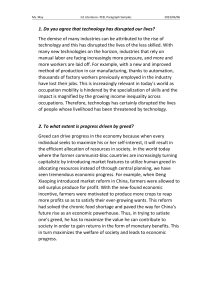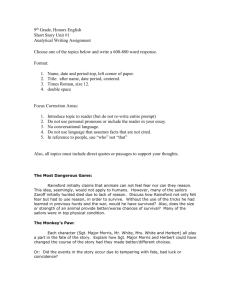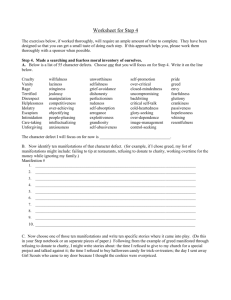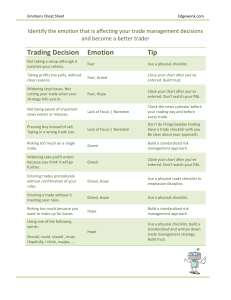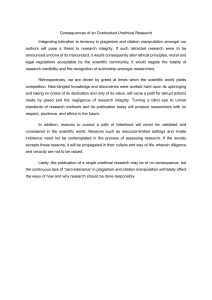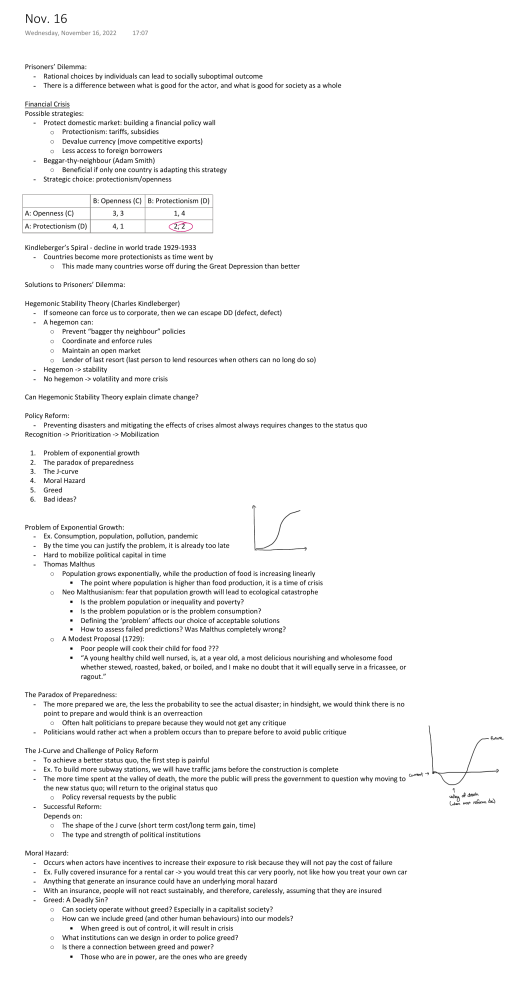
Nov. 16 Wednesday, November 16, 2022 17:07 Prisoners’ Dilemma: - Rational choices by individuals can lead to socially suboptimal outcome - There is a difference between what is good for the actor, and what is good for society as a whole Financial Crisis Possible strategies: - Protect domestic market: building a financial policy wall ○ Protectionism: tariffs, subsidies ○ Devalue currency (move competitive exports) ○ Less access to foreign borrowers - Beggar-thy-neighbour (Adam Smith) ○ Beneficial if only one country is adapting this strategy - Strategic choice: protectionism/openness B: Openness (C) B: Protectionism (D) A: Openness (C) 3, 3 1, 4 A: Protectionism (D) 4, 1 2, 2 Kindleberger’s Spiral - decline in world trade 1929-1933 - Countries become more protectionists as time went by ○ This made many countries worse off during the Great Depression than better Solutions to Prisoners’ Dilemma: Hegemonic Stability Theory (Charles Kindleberger) - If someone can force us to corporate, then we can escape DD (defect, defect) - A hegemon can: ○ Prevent “bagger thy neighbour” policies ○ Coordinate and enforce rules ○ Maintain an open market ○ Lender of last resort (last person to lend resources when others can no long do so) - Hegemon -> stability - No hegemon -> volatility and more crisis Can Hegemonic Stability Theory explain climate change? Policy Reform: - Preventing disasters and mitigating the effects of crises almost always requires changes to the status quo Recognition -> Prioritization -> Mobilization 1. 2. 3. 4. 5. 6. Problem of exponential growth The paradox of preparedness The J-curve Moral Hazard Greed Bad ideas? Problem of Exponential Growth: - Ex. Consumption, population, pollution, pandemic - By the time you can justify the problem, it is already too late - Hard to mobilize political capital in time - Thomas Malthus ○ Population grows exponentially, while the production of food is increasing linearly § The point where population is higher than food production, it is a time of crisis ○ Neo Malthusianism: fear that population growth will lead to ecological catastrophe § Is the problem population or inequality and poverty? § Is the problem population or is the problem consumption? § Defining the ‘problem’ affects our choice of acceptable solutions § How to assess failed predictions? Was Malthus completely wrong? ○ A Modest Proposal (1729): § Poor people will cook their child for food ??? § “A young healthy child well nursed, is, at a year old, a most delicious nourishing and wholesome food whether stewed, roasted, baked, or boiled, and I make no doubt that it will equally serve in a fricassee, or ragout.” The Paradox of Preparedness: - The more prepared we are, the less the probability to see the actual disaster; in hindsight, we would think there is no point to prepare and would think is an overreaction ○ Often halt politicians to prepare because they would not get any critique - Politicians would rather act when a problem occurs than to prepare before to avoid public critique The J-Curve and Challenge of Policy Reform - To achieve a better status quo, the first step is painful - Ex. To build more subway stations, we will have traffic jams before the construction is complete - The more time spent at the valley of death, the more the public will press the government to question why moving to the new status quo; will return to the original status quo ○ Policy reversal requests by the public - Successful Reform: Depends on: ○ The shape of the J curve (short term cost/long term gain, time) ○ The type and strength of political institutions Moral Hazard: - Occurs when actors have incentives to increase their exposure to risk because they will not pay the cost of failure - Ex. Fully covered insurance for a rental car -> you would treat this car very poorly, not like how you treat your own car - Anything that generate an insurance could have an underlying moral hazard - With an insurance, people will not react sustainably, and therefore, carelessly, assuming that they are insured - Greed: A Deadly Sin? ○ Can society operate without greed? Especially in a capitalist society? ○ How can we include greed (and other human behaviours) into our models? § When greed is out of control, it will result in crisis ○ What institutions can we design in order to police greed? ○ Is there a connection between greed and power? § Those who are in power, are the ones who are greedy
